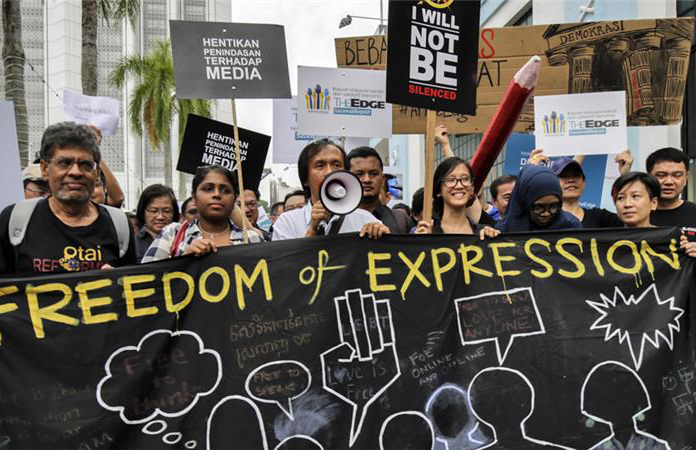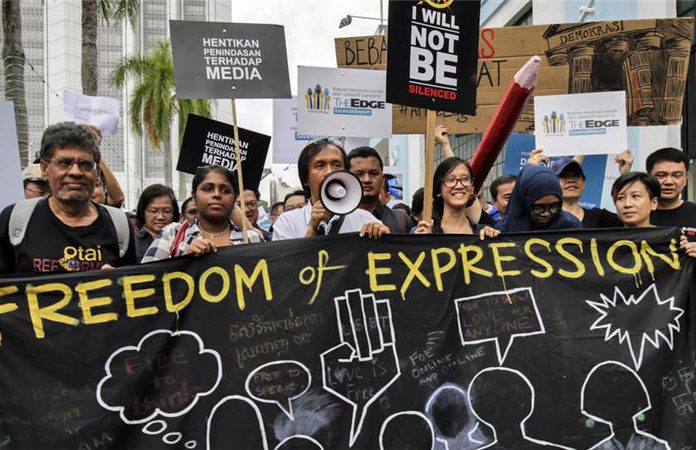
Malaysians protest against media censorship. Photo: EPA
Malaysia has a long history of cracking down on freedom of expression, writes Sonia Randhawa. But that won’t stop Malaysians from fighting back.
Over the past few weeks, the number of websites blocked in Malaysia has more than doubled, from 149 to 339, leaving the promises made about the country’s Multimedia Super Corridor lying in tatters.
Banned websites include The Malaysian Insider and the blogging platform Medium.com — apparently because of one article published on the 1MDB scandal. It’s akin to blocking YouTube because of one video.
It’s a long way from the attempts to foster a knowledge-based economy and modern state by 2020. If technology was meant to send Malaysians sprinting down the information superhighway, these recent moves represent dangerous obstacles to oncoming traffic.
It is, however, misleading to look at these events only in the light of a beleaguered Prime Minister clutching onto power. Najib Razak is far from the first Malaysian leader to have attacked freedom of expression. The onslaught of the media began before his father took power, and was framed in the debates on media freedom prior to Merdeka (independence).
As Communications and Multimedia Minister, Salleh Said Keruak, recently said, freedom of expression in Malaysia is framed as a privilege, rather than a right. It’s always been this way, and only granted in as far as it provided benefits for the community.
For example, the passing of the Printing Presses Ordinance in 1948 was followed by a sharp drop in the number of newspapers being printed. While this could have been due to the cost of the license, it seems likely that a number of newspapers were not granted licenses. From the inception of regulation in Malaysia, discussion and dialogue has been presented as being dangerous and in need of containment.
However, there are forces at work now, as there have always been, that contest these dangers. Two recent developments in the courts should be noted.
First, the dismissal of a defamation case brought by the Pahang Menteri Besar (Chief Minister) against the Malay-language Utusan Malaysia. The Court of Appeal dismissed the case on the grounds that he was initiating the action in his capacity as a public official, and that public officials holding public office could not sue for defamation, citing an English precedent. It is hoped that the ruling will now serve as a precedent in Malaysia.
Second, the court acquitted Lena Hendry, a human rights activist, who had been charged with contravening the Film Censorship Act, for showing a documentary on the plight of Tamil refugees from Sri Lanka. The case caught the attention of international human rights organisations, who claimed that it appeared politically motivated.
This is not to argue that the courts in Malaysia are playing a progressive role. This has been clear in a number of decisions, such as the one to reject the challenge to the constitutionality of the Sedition Act in a case by legal professor Azmi Sharom in October 2015. Nonetheless, it offers the possibility of a broader role for freedom of expression under at least the two pieces of legislation involved. These are more than balanced, by the rumoured forthcoming amendments to both the Official Secrets Act, and the Communications and Multimedia Act, which seem to promise harsher penalties and broader definitions for both.
What is most promising, however, is the lack of silence. In the past, even the not-too-distant pre-2008 days, fear could be relied upon to keep large numbers of the urban, middle-class elite in check. As prices rise, matched only by apparent government indifference, this fear has dissipated.
When banned, The Malaysian Insider rather than playing along, became The Malaysian Outsider. While that, too, has been blocked, Malaysians are finding ways around the blocks, fixes for the news. The constant struggle does have a cost though. Unfortunately, The Malaysian Insider has decided to call it a day, shutting down on Monday.
The #RespectMyPM campaign, a government response to former prime Mahathir and his coalition’s call to oust Najib and ‘Save Malaysia’, backfired spectacularly. This is not led by a network of politicians or even civil society, but a bubbling up from below. Since the 2013 election and the media crack-down then, an increasing number of Malaysians have learnt the advantages of a VPN — virtual private network, which can be used to evade local blocks on content.
Greater international scrutiny, such as the attention of the UK-based Sarawak Report, may be helping to dampen these fears. This scrutiny is likely to be greater following the arrest of two Australian journalists working for the ABC program Four Corners. The two are reported as having been asking questions about corruption and the murder of Mongolian translator Altantuya Shaariibuu, and have (at time of writing) had their passports seized and been told not to leave Malaysia.
This groundswell may be a primarily young, urban movement, but as the last general election and subsequent demonstrations have shown, it is becoming increasingly difficult for the government to contain and control their demands.
The Government of Malaysia is looking at ways of tightening up legislation to give them greater powers over cyberspace. Rather than seeing this as a reason to sit tight, it’s possible that a loosely-based network of local cyber-activists may take this as a challenge.
Sonia Randhawa is doing a PhD on the role of women journalists in the Malay-language media in the School of Historical and Philosophical Studies at the University of Melbourne. She is also a director for the Centre for Independent Journalism, Malaysia and a member of ISIS-International Manila, a feminist media network.
 Facebook
Facebook  Twitter
Twitter  Soundcloud
Soundcloud  Youtube
Youtube  Rss
Rss 